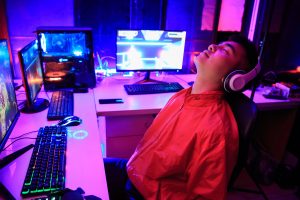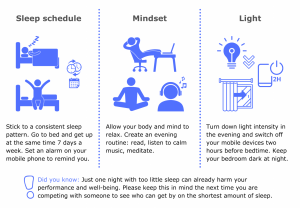Sleep has become a luxury in recent years. More so for esports athletes and content creators whose life and brand revolves around being online 24/7.
Being a professional esports athlete requires a lot of discipline. This includes sticking to a strict schedule — especially for teams who live in gaming houses — and having a daily routine that heavily revolves around practice, strategising and perfecting gameplay.

RELATED: Schalke 04 partners with mattress company Emma
Most players are essentially living in their workspaces, so taking a breather might be more challenging than it seems. Technically speaking, esports is the blueprint of what a ‘remote’ job looks like. However, creating a good work-life balance with a lack of time makes it easy for pro players to fall into unhealthy habits.
As a result, young pro gamers have announced early retirements from competitive play due to health problems. League of Legends player Jian ‘Uzi’ Zi-Hao retired due to chronic hand and shoulder injuries and was diagnosed with Type 2 diabetes. Also, Dallas Fuel’s Xzi stepped down from the Overwatch League’s 2021 season due to neck and shoulder issues.
The source of these health problems isn’t only the day-to-day reality of being an esports athlete, but it is also closely tied to the players’ lifestyles.
Nevertheless, it’s important to note that as esports evolves, a lot of these bad habits are being taken care of by organisations. Too much junk food? Get the team a private chef. Want to keep players active? Make a personal training programme. However, what about poor sleeping habits?
Get the team to do a sleep study. And a good mattress

Everyone needs a regular seven to nine hours of sleep every night to maintain their well-being. However, as the mental health and physical well-being of esports athletes are challenged daily to an above-average degree, they truly benefit from a good night’s sleep.
Having a good and supportive mattress also plays a huge role. As players spend most of their time sitting, good ergonomics help distress their intervertebral discs. A restful, comfortable and uninterrupted night could help gamers perform better and more consistently.
Getting a sleep coach and ensuring a good sleep routine is widely practised in traditional sports. From Premier League football teams to Tour de France-winning cyclists, a good night’s sleep has become a priority.
So it’s not surprising that esports teams have begun following these steps. Earlier this year, Gravitas announced a partnership with Flinders University for a sleep study. Prior to the esports organisation’s announced sale of its LEC spot, Schalke 04 Esports also teamed up with Emma – The Sleep Company to help its players improve their sleep schedules.
To learn more about restorative sleep and its benefits to pro esports athletes, Esports Insider spoke with Theresa Schnorbach, Emma’s Neurosciene and Sleep Research Working Student .
Schnorbach is running a sleep study with FC Schalke 04’s Esports team and is a team member of Dr Verena Senn, Emma’s Head of Sleep Research. When speaking to her, Schnorbach emphasised that restorative sleep can easily be maintained by pro gamers paying attention to some key areas in their daily routine.

Getting a good night’s sleep isn’t as easy as it seems
When the collaboration between Schalke 04 and Emma was announced, it was clear that the ultimate goal was to study and strengthen the skills that matter most in competitions. Reaction timing, visual working memory and emotional balance.
As part of studying the effect of sleep duration and sleep quality on the team’s reaction timing, the team completes a daily four-choice reaction time task. The speed and accuracy of their reactions are then recorded for future analysis.
“Esports players must absorb information rapidly and effectively before responding correctly, which frequently requires precise, fine motor movements,” Schnorbach commented. “Intuitive eye-hand coordination, a strategic mindset as well as concentration over a long time are of utmost importance.”
To measure the impact of healthy sleeping habits on the visual working memory the players complete a daily visual array task.

According to Schnorbach, the visual working memory is particularly important in esports competitions as “to identify and react to opposing strategies and tactics, Esports players must construct a mental picture of their opponent. Numerous information must be stored and evaluated in real-time.”
Last but not least, to examine the effects of sleep on emotional experience, the team answers a questionnaire compiled by Emma.
Professional tournaments require high-level competitive team play, which often evokes intense emotional responses from gamers. League of Legends tournaments are no exception, and the team’s emotional management can either make it or break it for them.
Alongside completing a daily general questionnaire to assess sleep quality, the team’s esports players also wear sleep trackers every night to learn about their sleep duration.
The other side of the pillow
As suggested, sleep seems to impact an esports athletes’ skills. But does excessive gaming impact sleep?
Poor sleep quality and short sleep duration are prevalent challenges for gamers in the current esports scene.
Flinders University also confirmed this in a sleep study, which reported that more than half of the gamers experienced sleep difficulties – including falling asleep late and awakening early in the morning.
However, to avoid exhaustion and maintain a healthy lifestyle, Schnorbach suggested: “To ease the side-effects of those circumstances – which on the other hand are necessary to compete in LoL – regularity is essential. Meaning going to bed ideally at the same time every night, let us say at 4 am, but sleeping uninterruptedly for seven to nine hours then.”
[primis_video widget=”5183″]
RELATED: Key esports sponsorships and partnerships, June 2021
The sleeping schedules of esports players don’t have to align with the ones of people who are working during the common nine to five timeframe. What would be ‘normal’ in this case, for example going to bed around 10 pm, isn’t a viable option for gamers who tend to sleep later at night.
As with any other wellness solution, there is no one-size-fits-all approach. Sleep is a personal matter, and sleep coaching and studying help cater specifically to the needs of each gamer. Whether someone’s an early riser or a night owl.

